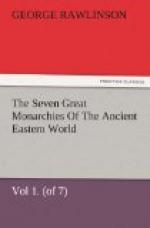Chaldaean history may therefore be regarded as opening upon us at a time anterior, at any rate by a century or two, to B.C. 2286. It was then that Nimrod, the son or descendant of Cush, set up a kingdom in Lower Mesopotamia, which attracted the attention of surrounding nations. The people, whom he led, came probably by sea; at any rate, their earliest settlements were on the coast; and Ur or Hur, on the right bank of the Euphrates, at a very short distance from its embouchure, was the primitive capital. The “mighty hunter” rapidly spread his dominion inland, subduing or expelling the various tribes by which the country was previously occupied. His kingdom extended northwards, at least as far as Babylon,—which (as well as Erech or Huruk, Accad, and Calneh) was first founded by this monarch. Further historical details of his reign are wanting; but the strength of his character and the greatness of his achievements are remarkably indicated by a variety of testimonies, which place him among the foremost men of the Old World, and guarantee him a never-ending remembrance. At least as early as the time of Moses his name had passed into a proverb. He was known as “the mighty hunter before the Lord”—an expression which had probably a double meaning, implying at once skill and bravery in the pursuit and destruction of wild beasts, and also a genius for war and success in his aggressions upon men. In his own nation he seems to have been deified, and to have continued down to the latest times one of the leading objects of worship, under the title of Bilu-Nipru or Bel-Nimrod, which may be translated “the god of the chase,” or “the great hunter.”
One of his capitals, Calneh, which was regarded as his special city, appears afterwards to have been known by his name (probably as being the chief seat of his worship in the early times); and this name it still retains, slightly corrupted. In the modern Niffer we may recognize the Talmudical Nopher, and the Assyrian Nipur which is Nipru, with a mere metathesis of the two final letters. The fame of Nimrod has always been rife in the country of his domination. Arab writers record a number of remarkable traditions, in which he plays a conspicuous part; and there is little doubt but that it is in honor of his apotheosis that the constellation Orion bears in Arabian astronomy the title of El Jabbar, or “the giant.” Even at the present day his name lives in the mouth of the people inhabiting Chaldaea and the adjacent regions, whose memory of ancient heroes is almost confined to three—Nimrod, Solomon, and Alexander. Wherever a mound of ashes is to be seen in Babylonia or the adjoining countries, the local traditions attach to it the name of Niinrud or Nimrod; and the most striking ruins now existing in the Mesopotamian valley, whether in its upper or its lower portion, are made in this way monuments of his glory.




